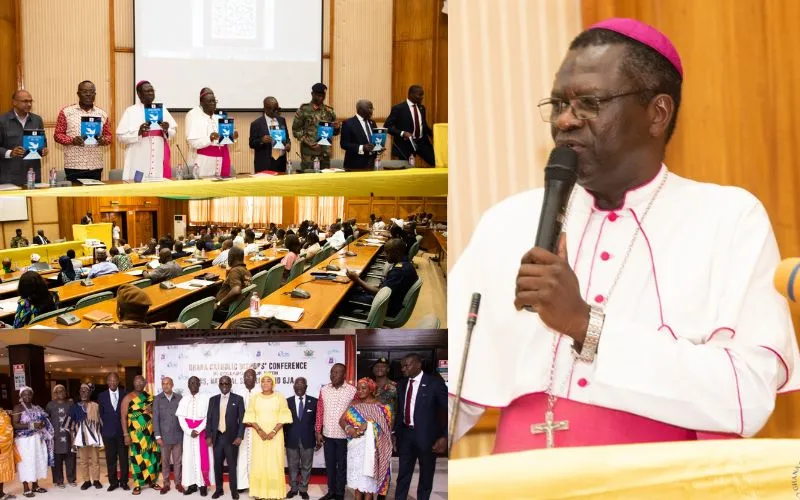Making citizen protection “a top priority” and ensuring that a country’s wealth is distributed fairly are among actions authorities in the African Sahel region and the wider West Africa need to take to address the “multifaceted violence”, a Catholic Bishop has said.
In a series of appeals during the July 30-31 Sahel Peace Initiative Forum that the members of the Ghana Catholic Bishops Conference (GCBC) organized, Bishop Alexandre Yikyi Bazié also highlighted good governance and ending corruption as vitally important actions if lasting peace is to be achieved.
“I solemnly launch this appeal to public authorities to make the protection of populations a top priority, promote good governance, fight against corruption, and ensure a fair distribution of wealth,” Bishop Bazié said on Tuesday, July 30, the first day of the event organized under the theme, “Building a more peaceful and cohesive Ghana: A collective endeavour.”
GCBC members organized the July 30-31 Sahel Peace Initiative to weigh in on challenge of extremism in the West African nation and the wider Sahel Region.
The African Sahel region spans 5,400 km and encompasses Senegal, Mauritania, Mali, Burkina Faso, Niger, Nigeria, Chad, Sudan and Eritrea.
In November 2019, delegates, who included Catholic Prelates and Clergy drawn from Bishops’ conferences in Burkina Faso, Niger, Mali, Ivory Coast, and Ghana convened the first-ever Inter-Conferences Workshop to discuss the security concerns in the African Sahel region.
The region had been facing rampant violence facilitated by political crisis in the countries, which were offering a fertile ground for the proliferation of extremist groups.
In their statement following the 12-13 November 2019 meeting in Burkina Faso’s capital city, Ouagadougou, which the Catholic Relief Services CRS) organized, the delegates outlined the role of some eight stakeholders in the process of ending the violence.
According to CRS, while Ghana and Ivory Coast are not part of the Sahel region, they were represented in the November 2019 meeting since “the region’s porous borders pose a real risk of the violence spreading to neighbouring countries.”
In his July 30 presentation, Bishop Bazié addressed himself to various stakeholders in the region, appealing that they undertake specific tasks to achieve lasting peace.
The Auxiliary Bishop of Burkina Faso’s Catholic Diocese of Koudougou in Burkina Faso, who doubles as the president of the Episcopal Commission for Justice and Peace in the West African nation urged members of the international community to ensure “respect of the self-determination of peoples, an end to the exploitation of resources in the region, and to stop armed sales that fuel conflict.”
He urged the diplomatic representatives in the West African region to focus on promoting “sincere partnerships and respect for international law” and the affected populations to “remain dignified and confident without yielding to hatred or vengeance.”
Members of the Non-governmental Organizations (NGOs) and the people of goodwill need “to work for a world of justice and peace,” the Burkinabe Catholic Bishop said during the two-day event held at Accra International Conference Centre, in Ghana.
He appealed to faith-based leaders in the region to educate their faithful “about the need to preserve religious freedom and promote interreligious dialogue.”
The crisis in the Sahel region and the wider West Africa, Bishop Bazié said, “manifests itself through terrorist attacks, resulting in target killings, attacks during religious services, the destruction of places of worship, the closure of schools and health services, and the destruction of community leaders’ homes.”
Advertisement
The complex crisis has contributed “to ethnic, community, and religious conflict, extending to coastal countries such as Ghana, Ivory Coast, Benin, and Togo,” he said at the event that GCBC members organized in collaboration with CRS, the humanitarian arm of the United States Conference of Catholic Bishops (USCCB).
Bishop Bazié lauded the faith-based leaders, government officials, and other participants in the July 30-31 meeting, saying, “Your engagement and contribution will always be valuable and decisive.”
“United, we will be stronger to fight against the multifaceted violence and establish lasting conditions for peace, social cohesion, and reconciliation for the happiness of our people,” he said.
The Auxiliary Bishop of Burkina Faso’s Koudougou Diocese implored, “May God strengthen our sub-regional communion and solidarity. May He grant His mercy to all victims of terrorism. May His spirit guide you for fruitful work so that together we can restore and strengthen peace, social cohesion, and reconciliation within our communities.”



